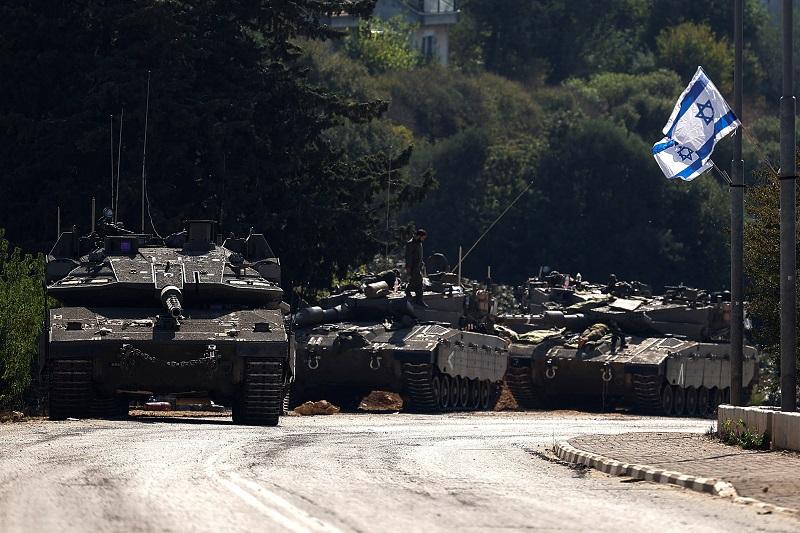Israel orders evacuation of more southern Lebanese towns

BEIRUT/CAIRO - Israel ordered more evacuations and targeted a new location in northern Lebanon on Saturday, as a third UN peacekeeper was wounded in Israel's escalating conflict with Iran-backed Lebanese group Hezbollah.
At least 15 people were killed and 37 wounded in Israeli strikes across three different areas in Lebanon, the Lebanese health ministry said. One of the targeted locations was in the town of Deir Billa in northern Lebanon, which had not been struck before.
The Israeli military also said Hezbollah had fired nearly 320 projectiles from Lebanon into Israel on Saturday, without giving further details. It declared areas around some towns in north Israel closed to the public.
Also on Saturday, Israel's military ordered residents of 23 southern Lebanese villages to evacuate to areas north of the Awali River, which flows from the western Bekaa Valley into the Mediterranean.
The order, communicated via a military statement, mentioned villages in southern Lebanon that have been recent targets of Israeli attacks, many of which are already almost empty.
The Israeli military said evacuations were necessary for the safety of residents due to increased Hezbollah activities, claiming the group is using sites to conceal weapons and launch attacks on Israel.
Hezbollah denies concealing weapons among civilians.
US Defense Secretary Lloyd Austin, in a call with Israeli Defense Minister Yoav Gallant, expressed "deep concern" about reports that Israeli forces had fired on UN peacekeeping positions in Lebanon in recent days and urged Israel to ensure safety for them and the Lebanese military, the Pentagon said.
Austin also "reinforced the need to pivot from military operations in Lebanon to a diplomatic pathway as soon as feasible," according to the Pentagon statement.
The Lebanese health ministry said on X that five hospitals sustained damage from the Israeli airstrikes in the eastern city of Baalbek and the Bekaa Valley. The Israeli military had no immediate comment, and Reuters was unable to independently verify the hospital strikes.
The Israeli military said on Saturday that Hezbollah was using ambulances to transport fighters and weapons and that it would take any necessary action. Reuters could not independently verify the Israeli accusation.
Medecins Sans Frontieres (MSF) last week was forced to close its clinic in a southern suburb of Beirut and temporarily stop its activities in another one in the north, because of heavy airstrikes, the group said in a statement on Thursday.
In the last two weeks, Israeli strikes have killed at least 50 paramedics, MSF said, adding the heavy bombardments have severely disrupted access to medical care across the country.
The Israeli military also said it had hit around 200 targets in Lebanon with artillery and airstrikes and killed around 50 Hezbollah fighters and dismantled dozens of weapons storage sites.
Significant damage
Another member of UNIFIL, the UN peacekeeping mission in Lebanon, was struck by gunfire on Friday, the organization said on Saturday, adding that the man was stable after undergoing surgery to remove the bullet.
The statement also said UNIFIL's position in the southern Lebanese town of Ramyah sustained significant damage due to explosions following nearby shelling, but did not specify who was responsible for either attack.
Two UN peacekeepers were wounded by an Israeli strike near their watchtower in south Lebanon on Friday, drawing condemnations from the global body and various countries.
A group of 34 countries participating in the UNIFIL mission issued a joint statement condemning the recent attacks on the peacekeepers' base and calling for all parties to ensure their safety.
Hezbollah said that it had attacked the outskirts of Tel Aviv with a swarm of drones on Friday, without giving further details. Israel said there were no casualties reported when its military detected and intercepted two drones from Lebanon.
The conflict between Israel and Hezbollah militants erupted one year ago when the Iranian-backed group began launching rockets at northern Israel in support of Hamas, at the start of the Gaza war.
It has intensified in recent weeks, with Israel bombing southern Lebanon, Beirut's southern suburbs and the Bekaa Valley, killing many of Hezbollah's top leaders, and sending ground troops across the border.
Hezbollah for its part has fired rockets deeper into Israel.
The Israeli campaign has forced approximately 1.2 million people from their homes since Sept. 23, according to the Lebanese government.
Israel says its Lebanon offensive aims to secure the return home of tens of thousands of people who evacuated northern Israel due to Hezbollah rocket fire.
As of Friday the death toll had reached 2,255 since the beginning of hostilities, the Lebanese Health Ministry said on Saturday.
The United Nations Office for the Coordination of Humanitarian Affairs said on Saturday that more Lebanese have now been displaced than during the last major war between Israel and Hezbollah in 2006, when around 1 million fled their homes. —Reuters




